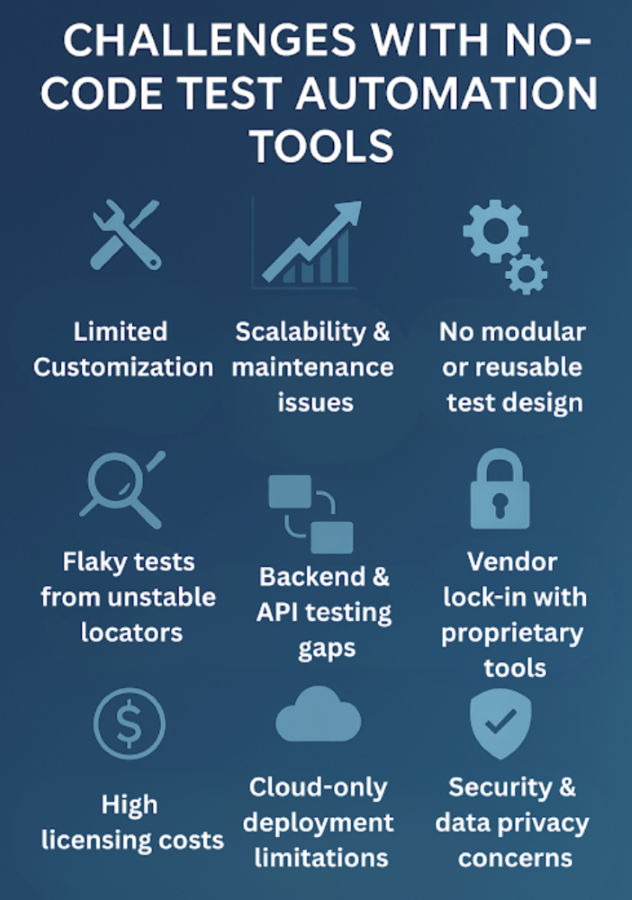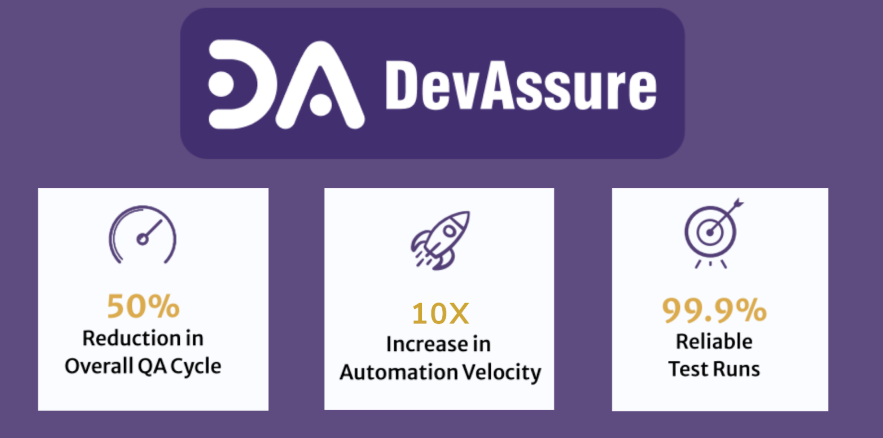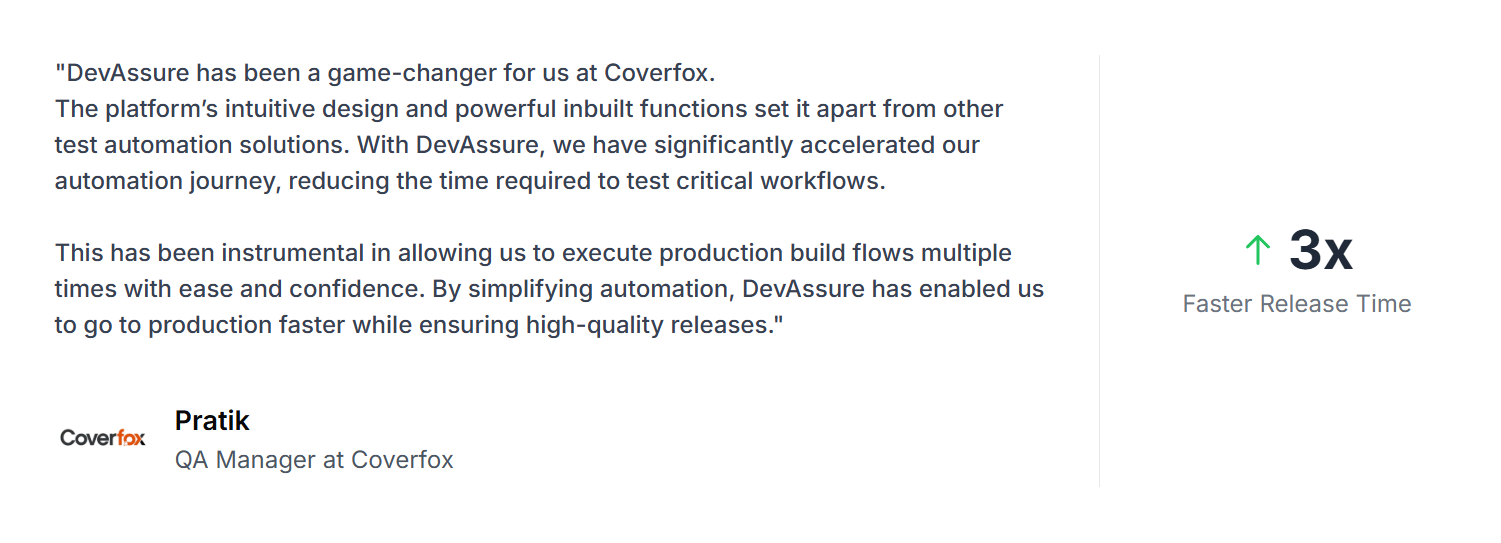Why Teams Fear No-Code Test Automation (And How to Overcome It)
Over the past few years, I have been reading a lot of posts on LinkedIn and Reddit on why SDETs and Test Automation Engineers find it hard to trust test automation tools, especially the no code solutions. Here’s one on Reddit.
Why Teams Fear No-Code Test Automation Tools?
Being an SDET, for the most part of my career I have faced similar issues and conflicts. I decided to dig deeper here and try to understand the real problem, and that's what led us to build DevAssure. This blog tells you why we built DevAssure.
Introduction
The CTOs and the leadership teams in growing organizations always face a conflict - how do we add quality gates to make sure the releases are seamless, faster and of high quality. The answer is always Test Automation.
They have to decide which approach to take - build an inhouse test automation framework using open source tools like Selenium and Playwright or evaluate existing no code test automation tools.
Why CTOs Consider No-Code Test Automation Tools
While building in-house test automation tools provide the room for a lot of customizations based on the app being tested and the organization requirements, here are a few cons. These cons are based on the time that I have personally spent in building such test automation frameworks.
These cons are based on the time that I have personally spent in building such test automation frameworks.
Top 5 Challenges with No-Code Tools
-
Time taken to build the automation frameworks
-
Test automation maintenance
-
Changing designs leading changing automation
-
Updating and maintaining the libraries and the versions
-
Writing a lot of code for 3rd party integrations, customized reporting, libraries for testing different parts of the application
For this and many other reasons CTOs and engineering leaders prefer using the no code tools. But, is that an easy decision - definitely not.
Challenges with using No-Code Test Automation Tools
No-code test automation tools offer speed and accessibility, but they also come with several challenges that can impact scalability, maintainability, and effectiveness. Here are the major challenges:

-
Hard to customize - No-code tools often struggle to handle complex user interactions, custom logic, dynamic content, or edge cases.
-
Scalability and Maintainability issues - Tests created using no code tools can become brittle and hard to manage as the application evolves.
-
Lack of Reusability and Modularity - Many tools do not support modular test designs making the tests redundant and bloated.
-
Poor locator strategies - Without AI/stable locator strategies, even small UI changes can break the automation or lead to flaky tests.
-
No API/Backend Testing Support - Most of the no code tools focus primarily on UI testing. But end to end tests involve API validations, Database validations, Email testing, network mocking etc.
-
Vendor lock-in - Tests are often stored in proprietary formats, making it hard to migrate to another tool.
-
Licensing costs - Licensing can be expensive, especially if the pricing is based on test runs, parallel executions, or team size.
-
Cloud based solutions - Many no code tools are cloud based leading to lack of control on the test scripts and inability to maintain version control for test scripts.
-
Security and Data Privacy Concerns - Running tests in vendor-controlled environments may not be ideal for sensitive apps or enterprise-grade compliance requirements.
No code test automation tools help increase automation velocity and improve the productivity of the engineering teams - but the cons outweigh the pros. This makes CTOs and Engineering leaders skeptical about using no code tools.
Read More: Explore proven cross-browser testing strategies to ensure consistent user experiences across different browsers and devices
How is DevAssure Different from Other No-Code Tools

While no-code test automation tools have gained popularity for their speed and accessibility, many solutions struggle to meet the real-world demands of scaling applications, handling complex test scenarios, and maintaining data privacy. DevAssure was purposefully built to close these gaps.
Our platform brings together the best of no-code speed with the depth of traditional frameworks offering secure on-premise deployment, AI-driven locator stability, backend testing support, and flexible test portability. Here's how DevAssure redefines what teams should expect from no-code test automation.
🚀 See how DevAssure accelerates test automation, improves coverage, and reduces QA effort.
Ready to transform your testing process?
- On Prem Solution - Security and Data Privacy is a priority
DevAssure is an on prem solution, which means you would have to download the application/IDE for test automation and install it on your system. This ensures full control over your test data, infrastructure, and compliance. Unlike SaaS-only no-code tools, DevAssure seamlessly integrates into your private networks and CI/CD pipelines without compromising data privacy. DevAssure is also SOC2 compliant.
- Reliable and Configurable Locator Strategies
DevAssure uses AI to identify stable locators based on how the application is rendered in the browser. The strategy adapts dynamically to different DOM structures, and users can configure the engine to prioritize specific attributes or paths minimizing flakiness and improving test reliability.
- Modular and Reusable Frameworks
DevAssure’s engine automatically structures test scripts using the Page Object Model, ensuring scalability and maintainability. The underlying framework is configurable and can be tailored to suit the architecture of the application under test.
- No Vendor Lock-in
While DevAssure uses a proprietary format to manage test scripts for enhanced performance and reusability, it also offers the flexibility to export tests to open-source frameworks like Playwright giving teams full control and portability.
- Customizations
DevAssure not only allows customization of the underlying test framework but also supports adding custom code and libraries enabling teams to extend automation based on specific application logic or testing needs.
- Support for API/Backend testing
DevAssure enables true end-to-end test automation for complex applications, allowing users to perform API calls, database validations, email verifications, and network log tracing all within a single, unified platform.
Read More: What is API Testing? How does DevAssure simplify API Testing?
Why Users Love DevAssure
QA Manager at Bank Bazaar says

QA Manager at Coverfox says

An SET and Business Analyst says
"Flutter App Automation - DevAssure's great support team, all-in-one low-code solution, and effectiveness in testing our Flutter app have been invaluable for streamlining our testing process and automating end-to-end tests in a reasonable timeframe"
A QA engineer says
"All in one low code solution - DevAssure offers advanced interaction tracking for complex UI elements and flexible test automation with both record-and-play and scripting. The great support team is a standout feature. It's an all-in-one low-code solution, eliminating the need for multiple stacks, and effectively tests Flutter apps, which is unique."
Why Choosing the Right No-Code Platform Matters
Choosing the right no-code test automation platform is no longer optional - it’s critical. While many no-code tools promise faster automation, they often introduce hidden challenges around scalability, maintenance, and security.
DevAssure bridges this gap by offering a secure, on-premise solution that combines AI-powered stability, modular frameworks, backend testing capabilities, and the freedom to export tests without vendor lock-in.
With DevAssure, teams don’t have to choose between speed and control- they get the best of both worlds to scale confidently, release faster, and protect what matters most. Curious to learn more? Let's chat - book a personalised demo with DevAssure.
